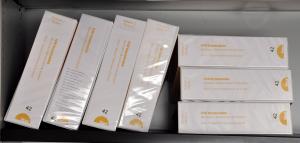A long-expected letter
22 Jun 2012
Licensing a nuclear installation requires the production of thousands of pages of technical documents, like the seven-volume, 5,243-page DAC files that provide an in-depth description of the ITER installation.
The official letter from the French Safety Authority (Agence de sûreté nucléaire - ASN) that the ITER Organization received on 20 June marks a major milestone in a lengthy, complex and demanding process that began a year and a half ago.
After months of in-depth technical examination, the ASN has judged that the ITER Organization's proposal on the operational conditions and design of the installation fulfils the expected safety requirements at this stage of the licensing process.
In simpler words, this is the long-expected green light meaning that the French government authorizes the construction of ITER.
Licensing a nuclear installation takes considerable time, requires the production of thousands of pages of technical documents, and mobilizes scores of experts and institutions. ITER is the first fusion facility to undergo this licensing procedure in France.
As a consequence, at decisive stages in the procedure like the one announced this week, there is a feeling of deep satisfaction among all those who were involved in the process.
In practical terms, a peer committee of ASN and ITER Safety, Quality & Security experts will now work on drafting the decree that will be submitted to the French government's signature. This highly detailed document can be described as "the safety contract" that will bind the ITER Organization (as nuclear operator) and the French State for the whole duration of the installation's lifetime.
The final decree that should be signed by the French President or his Prime Minister is expected to be issued in the last months of 2012.


